- Home
- Michael Crichton
Scratch One Page 2
Scratch One Read online
Page 2
Liseau sat back, and allowed his words to sink in. The five men were staring at their hands. Well, what did they expect? Congratulations?
“It is true,” he continued, “that the efforts in Lisbon and Copenhagen were satisfactory, but there have been too many mistakes. The use of strychnine on Bjornstrand was inane; the autopsy will certainly show he was poisoned. Gallamine would have been far preferable.” Gallamine was like curare, a potent muscle relaxant. Overdoses produced such severe relaxation that the patient could not breathe, and went into shock. But it looked natural, that was the point—it could be heart failure, anything. Liseau sighed.
“Time is running out, gentlemen, and we cannot afford more bumbling. There are two new developments about which you should be informed. First, the assassin from America is coming, as expected. He left New York yesterday, and is now in London. Presumably he is being briefed by the Paris head, a man called Amory. We know Amory left for London this morning. The Consulate here is expecting the American to arrive in Nice tomorrow. He must be dealt with.”
Liseau paused to light a cigarette.
“Second, I have called in outside help—someone who will, I hope, make no mistakes. The man is Ernst Brauer.”
The reaction to this was immediate. The men looked up, puzzled, concerned. And with good reason—Herr Brauer was widely known as a cleanser of organizations, a ruthlessly efficient hunter of traitors.
“You are displeased?” Liseau asked mildly.
The balding Italian answered. “It is not that,” he said, gesturing helplessly with his hands. “But there is some question of Brauer’s activities in Berlin in ’58. …”
Liseau waved a slim, impatient hand. His hands were beautiful, one of the first things one noticed about him. They moved gracefully when he spoke, skillfully when he held a scalpel. The fingers were long and strong, and beautifully groomed. “You are too polite,” Liseau said. “What you mean is that he may have gone double in Berlin.”
The Italian shrugged, noncommittal. “It was a rumor.”
“It was a fact. Herr Brauer is motivated only by money. In our case, we will see that he is amply paid.”
“Have you met with him?” another man asked.
“Yes,” Liseau lied. It was better to present these men with a fait accompli. “Yes, I met with him yesterday.”
“So long as you are satisfied.”
“I am.” It was a quiet statement, but definite. Nobody questioned him further.
“What about this American killer?”
Liseau smiled. “He will not trouble us, I assure you. A reception for him has been planned, a quite satisfactory reception. He will never get off his plane.”
I wish I could be so confident, Liseau thought. And I wish I knew what was being discussed at that briefing. He glanced at his watch, and stood. It was almost time for his appointment with Brauer.
Saturday: London
They met for dinner in a private room above a restaurant off Tottenham Court Road. Amory, the Paris man, arrived first, and viewed Morgan with deceptively casual interest as he came in. They shook hands.
“Drink?” Amory asked.
“Fine,” Morgan said. “Dry vermouth on the rocks.”
Amory ordered. It was an interesting drink, he thought—alcoholic, but weak. It fitted a man whose business was killing. When they were alone, he said, “It could be messy, very messy.”
“I expect so. It usually is.” Morgan had a childish, pudgy face. He looked rather cherubic—not like an angel, really, but more like a satyr or a practical joker. There was a disarming air of amusement about him which made his hard, flat statements incongruous. He doesn’t talk the way he looks, Amory thought. Not at all.
Amory was interested in Morgan; he was a rare type—an American killer with none of the cheap gangsterish qualities of so many American hired men. There was something about the American personality which precluded the possibility of a cool, sophisticated murder. The Europeans were much better at it, and Amory, in his work, generally relied on Europeans.
“I’m afraid this briefing will be rather lengthy. It’s a woefully complicated business. How much have you got already?”
“Just the bare outlines. A shipment of guns that Washington would like to see delivered, and that some others are anxious to stop.”
Amory nodded. “I wish it was that simple. The guns are automatic rifles and small arms, Norwegian surplus. The Norwegian army is updating its issue, and these weapons were auctioned about three weeks ago. The whole lot was bought up by a man named Bjornstrand. I just received a call that he died four hours ago in Copenhagen.”
Morgan did not seem startled. “Any details? Autopsy?”
“One is being performed, and we are trying to get a preliminary summary. But it has to go through the Danish and Norwegian Governments before we can get our hands on it, and I don’t think we’ll know for two weeks. It might have been natural—he died right in the lobby of his hotel—or it might have been very daring.”
The drinks came, and conversation broke while the waiter was in the room. When they were alone again, Amory said, “Maybe I had better start from the beginning.” He took out a pocket notebook, and thumbed through it. “I couldn’t bring the file, so I won’t be able to give you all the minutiae, but basically it goes like this: in March of this year, the Israeli Government approached several people about the availability of new automatic weapons. It was a panic move, initiated by a leak that Czechoslovakia was supplying automatic stuff to Egypt and Syria. At that time, in March, nothing was around. Then, very conveniently, the Norwegians decided to unload all their equipment. An arrangement was set up through a fellow named Victor Jenning. He’s an American who lives in Monaco and has been supplying armaments for years to everybody. Did it for Sukarno; did it for the Turks, and the Venezuelans. He’s a strange type, purely an intermediary—he has no stock of his own, he simply buys and resells. His passion is automobile racing, and fast women, and he’s been married—”
“I’ve heard of him.”
“Ummm. Well, anyway, Jenning was to arrange for a shipment from Copenhagen to Marseilles, and from there to Israel. All hush-hush, since the Arabs would go through the ceiling if they found out beforehand. We initially favored—unofficially—this transaction. We even put up some of the capital,” Amory added, slightly embarrassed.
Morgan sipped his vermouth slowly, and lit a cigarette.
“Now it gets sloppy,” Amory continued, consulting his little notebook. “Monday night an attempt was made on Jenning’s life. Then on Tuesday the Egyptian police recovered the body of a French businessman outside Cairo. This fellow’s job, actually, was to discover if the Egyptians had any inkling of the impending arms sale. He was being paid a per diem rate.”
Morgan knew what Amory was saying. The Frenchman had taken on a very risky job.
“Then we had a bad day yesterday: a man in our organization was being transferred to Nice, to help out. He was killed in Lisbon. No details. Now the Norwegian intermediary dies in Copenhagen. Very messy, and it gets worse.
“This morning I got a panic memo from Washington. It seems that a visiting committee from the International Atomic Energy Commission has been looking over the new Israeli reactor, the one we helped build, the only one in the Middle East. It was supposed to be a research reactor. But it is now geared for making plutonium.”
“I don’t think I follow you.”
“It’s really very simple, and very serious. The Israeli reactor is churning out the raw materials for an atomic bomb.”
“I see. And the Arabs haven’t got a reactor?”
“No. There are only sixty-eight reactors in the world, and only ten countries have them. The United States has the largest number, twenty-four; Russia has eleven. There’s no point in worrying about the big countries. It’s the little ones we have to sweat.”
“Is Israel actually making a bomb?” Morgan asked.
“Now that,” Amory said, “is anybody’s g
uess. They’re certainly going to be hard put to find a test site. But they might, that’s the point.”
“And the Arabs are shaken up?”
“To put it mildly. Look at it from their position. They see that we’ve helped finance a reactor for Israel. We say we didn’t know they were going to use it for a bomb, but you can’t expect them to believe that. Now, they hear of a big arms shipment. Their panic and mistrust could explode into a war.”
“What’s Washington want done?”
Amory threw up his hands in irritation. “Well, we’ve screwed it up already. Washington is committed to the arms shipment. We can’t back out without appearing to let down our ally, Israel. And we can’t go forward without appearing to be engaged in a subversive plot against the Arab world. Washington has decided to push forward with the shipment anyhow, and try to present it as a fait accompli to the Arabs, who have not yet formally announced that they know of the shipment. In fact, they don’t seem to intend to announce it—they’re going to try to stop it on the sly. They’ve got a group in Nice working on it. We have to knock out that group.”
“Arabs?”
“In Nice? No. Frenchmen—old Algerians, I think. Professional people. Their leader is a surgeon.”
“Sharp?”
“Very sharp.”
“You want him killed?”
“Yes.”
“And the others?”
“If possible.” He handed Morgan a packet. “This is our file on the group, the Associates. It has pictures. All you’ll need, I think.”
Morgan did not open it.
“Do they know I’m coming?” he asked.
Amory folded his hands in his lap and smiled grimly. “I wish I knew,” he said.
Saturday: Nice
Liseau, wearing his sunglasses, examined his visitor. God, he’s ugly, he thought. He looks just like a pig, with that round face, upturned nose, and narrow, squinting eyes.
“You have impressive credentials,” Liseau said, picking up a scalpel from his desk. As a surgeon, he enjoyed scalpels. He liked to have them in his hands, to play with them, to sense their sharpness. He watched the pig-faced man, Ernst Brauer. Brauer did not blink, though his eyes followed the scalpel.
“Your nerves are good, deutsche schwein.”
Again, the man did not blink. You could not startle him, Liseau saw, you could not insult him. He was entirely impassive, a great blond murder machine. The surgeon looked at the body, the bunched muscles in the shoulders and forearms, the heavy, bulging calves and thighs. There was power and endurance in him, no doubt of it. If there was discipline as well, he might be ideal.
“You speak languages?”
“French, English, Spanish, and German.”
Liseau smiled thinly and drew a cigarette from an inlaid box on his desk. He did not offer one to Brauer, nor did he light his own. He waited.
“Is there anything you do not do?”
“Yes. I do not kiss my employer’s ass.”
“Very wise.” Liseau lit his cigarette. So the insult had shown through, after all. This man had a limit, a final point beyond which abuse was intolerable. That was reassuring: Liseau did not want a totally unfeeling automaton around him. Somewhere, there must be an end to detachment and efficiency, and a beginning of passion.
“How is your tongue?”
“Silent enough,” the German grunted. When he grunts, he is even more like a pig, the surgeon thought. Liseau stood up from behind his desk, looking slim and dark—just the reverse of the blond chunk of muscle he faced.
“Good. I believe we can do business.”
Ernst Brauer nodded. He knew that Liseau regarded him as an animal. Most people did—Brauer had long since grown accustomed to the reaction of people to his physical appearance. But he knew something about Liseau, and what he knew disturbed him.
Liseau was very good at his job. In appearance, he was elegant and imperturbable; his manner precise, his movements calculated and economical, his speech careful. He gave the impression of a man who makes no mistakes, and that was a good impression for a surgeon to give.
But Brauer knew some less elegant and aristocratic facts about Liseau. He had been born in Algiers, the son of a French doctor and an Algerian beauty—which no doubt accounted for his dark skin and his ascetic face. During the Algerian War, he was rumored to have helped the OAS, as a torturer. Brauer loathed torture. In his own direct manner, he found it repellent. He was willing to kill a man, if he was paid enough, but he would not prolong the agony for any reason. His every instinct was toward swiftness, sureness. He was not a sadist, though God knew he looked it.
But this one, he thought, smiling blandly at Liseau. This one is dangerous. He never loses his temper, never speaks loudly, never falters in his control. It is the legacy of his training, and the inclination of his personality.
He is like a cobra, Brauer thought. Haughty and aloof, able to strike with startling precision. I am sure, he thought, that he does not trust me. We are too different.
“But you would not object, I hope, to a small demonstration of faith?” Liseau asked.
Brauer shrugged. It was, for him, a massive gesture. He barely listened to the conversation; he was wondering why Liseau wore sunglasses all the time. Perhaps he had weak eyes. Perhaps it was a trick, a way to disconcert people, to draw their attention away from other aspects of him. It was effective, Brauer had to admit that.
“Good,” Liseau said. “There is a man named Revel in Paris, in a hospital. I do not care how you do it, so long as you are not caught. Shall we go over the details?”
“All right.”
Liseau sat down again, and offered Brauer a cigarette.
Chapter III
Sunday: Paris
IT WAS THREE IN THE morning, and most of the lights in the hospital corridor were out. Brauer padded down the hall in crepe-soled shoes. The doors into the various rooms were all open; he could see the patients, snoring and wheezing, in the glow of the dim night-lamps.
He came to one door that was closed. That would be Revel’s room. But was he alone? Brauer put his ear to the door, and listened. He heard the faint scratch of a match, and the sound of feet shifting position.
So there was a guard.
He reached in his waistband, and withdrew the Luger 9 mm. It was a gun he favored, despite its weight and the difficulty in obtaining ammunition. It fired a special eight-round cartridge called the Parabellum, and would not handle ordinary 9 mm ammunition. And, of course, it had been discontinued since 1942, when the German Army switched over to the Walther P-38. But he was attached to it, and it had never jammed on him yet. That was something.
Brauer never used a silencer. To be effective, they had to be ponderous things, ruining the balance of a pistol; they were a waste of time, a superfluous precaution. So few people were familiar with the sound of a gun that it was rare for a listener to associate a loud noise with a gunshot. He had many times fired guns in houses and hotels, in the dead of night, and nobody had ever complained, or investigated.
A hospital might be a different matter, however. Any loud sound would be checked—a nurse would probably conclude that a patient had fallen out of bed. He would fire the Luger here only as a last resort.
He listened again at the door, trying to decide whether the guard would be to his left or right as he entered. It was impossible to say; he could hear nothing.
With the safety still on, he put the Luger in his left hand and opened the door with his right, very quickly.
He took in the whole room in a glance. A little fellow was seated in a chair to the left, a gun in his lap; Brauer struck him viciously across the face with his Luger barrel. The man groaned and fell over. Brauer picked him up and drove his fist into the pit of the man’s stomach. Then he dropped him like a wet rag.
Revel lay on his back, on the bed. He had not stirred; probably he was under heavy sedation. So much the better, Brauer thought. He placed his fingers on each side of Revel’s windpipe, f
eeling for the pulse of the carotid arteries. Then he squeezed hard, knowing that it would have the dual effect of stopping most blood supply to the brain, and also slowing heart rate through reflex action. Ernst Brauer knew a good deal about anatomy and medicine—it was part of his job. He was aware that he must pinch off the arteries for several minutes to be sure of success. In five minutes, even if Revel were not killed, his brain damage would be so severe that he would probably never utter another coherent word in his life.
Brauer squeezed. Revel began to stir, and he put his hand over the man’s mouth. He kept one wary eye on the door; at any minute, a nurse could walk by, making evening rounds.
But nobody came. And nobody saw Ernst Brauer leave six minutes later, silently, a great hulk in the night.
Sunday: London
The telephone rang. Morgan did not move, but his eyes opened wide. He always awoke that way, instantly alert, catlike. His eyes roamed the room cautiously, and then he sat up to answer the phone. It would be the desk, awakening him in time for his flight.
“Mr. Morgan? Long distance from Paris. Please hold the line, sir.”
That was a surprise. He waited impatiently.
“Hello. Morgan? Amory here.” He sounded tired and depressed. “Afraid I can’t make it today, so you’d better not come. A dear friend of mine, from Marseilles, was killed last night in his hospital bed. Very bizarre, and I’ve got to do what I can, as a friend of the family. Perhaps we can postpone our plans?”
“I hope so. That’s distressing news,” Morgan said, lighting a cigarette. “What do you suggest?”
“Well, I think we could proceed as scheduled in a day or so. Suppose you put off things for twenty-four hours. I’ll call you if there will be a further delay. All right?”
“All right. Sorry to hear the news.”
“Very messy,” Amory said.
When Amory had hung up, Morgan lay back in bed, stared at the ceiling, and finished his cigarette. Then he got up, showered and shaved, and called Air France to cancel his ticket to Nice that morning.

 Dragon Teeth
Dragon Teeth Jurassic Park
Jurassic Park Micro
Micro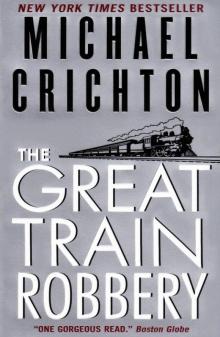 The Great Train Robbery
The Great Train Robbery The Andromeda Strain
The Andromeda Strain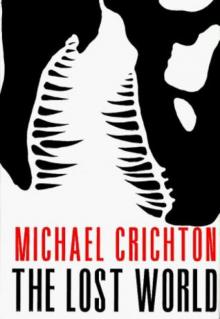 The Lost World
The Lost World Congo
Congo Travels
Travels Timeline
Timeline Sphere
Sphere Westworld
Westworld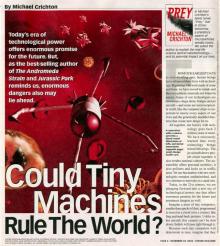 Prey
Prey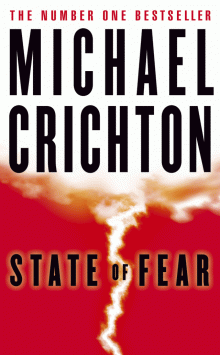 State Of Fear
State Of Fear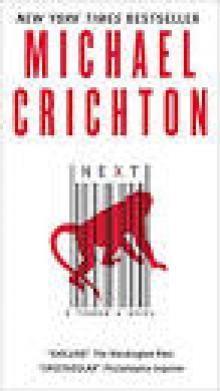 Next
Next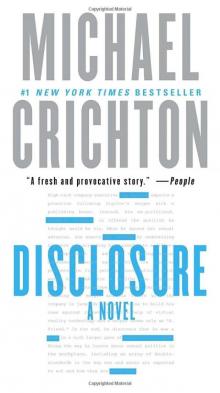 Disclosure
Disclosure Pirate Latitudes
Pirate Latitudes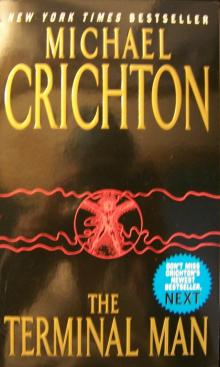 The Terminal Man
The Terminal Man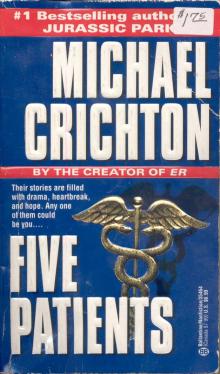 Five Patients
Five Patients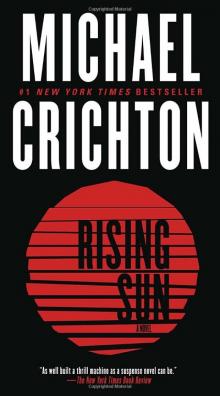 Rising Sun
Rising Sun Binary
Binary The Andromeda Evolution
The Andromeda Evolution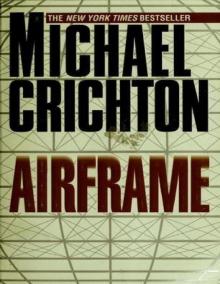 Airframe
Airframe Easy Go
Easy Go Drug of Choice
Drug of Choice Odds On: A Novel
Odds On: A Novel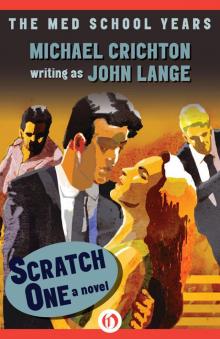 Scratch One
Scratch One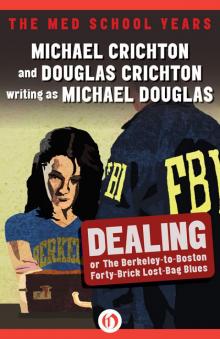 Dealing or The Berkeley-to-Boston Forty-Brick Lost-Bag Blues
Dealing or The Berkeley-to-Boston Forty-Brick Lost-Bag Blues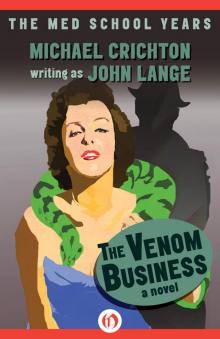 Venom Business
Venom Business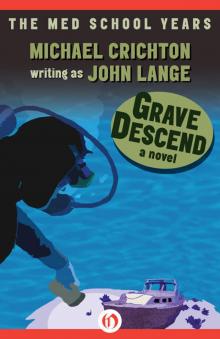 Grave Descend
Grave Descend Gold - Pirate Latitudes
Gold - Pirate Latitudes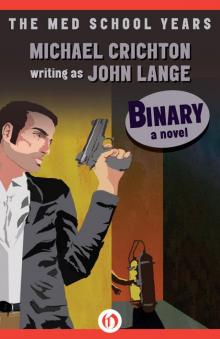 Binary: A Novel
Binary: A Novel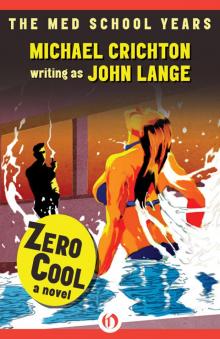 Zero Cool
Zero Cool Delos 1 - Westworld
Delos 1 - Westworld